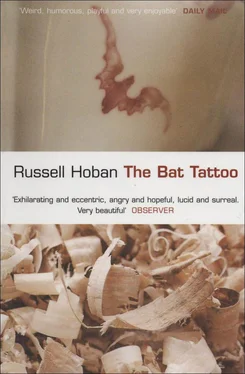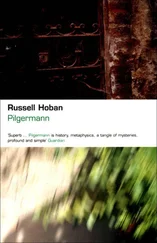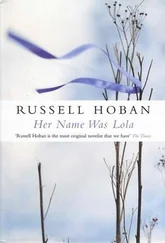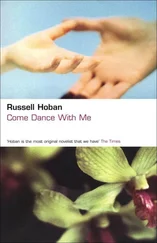Russell Hoban - The Bat Tattoo
Здесь есть возможность читать онлайн «Russell Hoban - The Bat Tattoo» весь текст электронной книги совершенно бесплатно (целиком полную версию без сокращений). В некоторых случаях можно слушать аудио, скачать через торрент в формате fb2 и присутствует краткое содержание. Год выпуска: 2004, Издательство: Bloomsbury Publishing PLC, Жанр: Современная проза, на английском языке. Описание произведения, (предисловие) а так же отзывы посетителей доступны на портале библиотеки ЛибКат.
- Название:The Bat Tattoo
- Автор:
- Издательство:Bloomsbury Publishing PLC
- Жанр:
- Год:2004
- ISBN:нет данных
- Рейтинг книги:4 / 5. Голосов: 1
-
Избранное:Добавить в избранное
- Отзывы:
-
Ваша оценка:
- 80
- 1
- 2
- 3
- 4
- 5
The Bat Tattoo: краткое содержание, описание и аннотация
Предлагаем к чтению аннотацию, описание, краткое содержание или предисловие (зависит от того, что написал сам автор книги «The Bat Tattoo»). Если вы не нашли необходимую информацию о книге — напишите в комментариях, мы постараемся отыскать её.
The Bat Tattoo — читать онлайн бесплатно полную книгу (весь текст) целиком
Ниже представлен текст книги, разбитый по страницам. Система сохранения места последней прочитанной страницы, позволяет с удобством читать онлайн бесплатно книгу «The Bat Tattoo», без необходимости каждый раз заново искать на чём Вы остановились. Поставьте закладку, и сможете в любой момент перейти на страницу, на которой закончили чтение.
Интервал:
Закладка:
‘Whatever,’ said Martha. ‘Don’t drink too much. The last time I schlepped you up the stairs I put out my back.’
‘We drink to your back and also your front, Martha,’ said Dieter as he poured for us and we raised our glasses. ‘Zwm wohl! ’
Martha wagged a finger at him and disappeared upstairs.
‘Like this Schnaps is Morgenstern,’ said Dieter. ‘Clears the brain. Prosit! ’
‘Here’s looking at you, kid,’ I responded. We both sipped delicately but greedily. The Schnaps was chilled and it went down like bright and sparkling winters and left me with a cosy fire inside at which to warm myself.
‘What do you do about Christmas?’ he said.
‘I drink very much and read M. R. James.’
‘ Mensch! Look what I have on my bench.’ He indicated something I’d been going to ask him about. On a base about four feet long and a foot and a half wide was a spooky little wood with black trunks and branches and dark leaves shadowing a path on which was the figure of a man in black with a very pale face. One shoulder was lifted as if to ward off an attack. Some paces behind him was something that was difficult to see clearly because Dieter had veiled some of the spaces between the trees with scrim cloth. It was a creature draped in white to halfway down its legs which were brown and speckled, the feet very nasty.
‘That’s from “Casting the Runes”,’ I said, ‘but in the story it’s a boy.’ There was a collected M. R. James on the work-bench, and I quickly found the lines which I almost knew by heart:
And this poor boy was followed, and at last pursued and overtaken, and either torn to pieces or somehow made away with, by a horrible hopping creature in white, which you saw first dodging about among the trees, and gradually it appeared more and more plainly.
‘This I know,’ said Dieter, ‘but my client wants not a boy but a little man with a pale face. Press the button.’
When I did that, there sprang up from concealed speakers ‘Some Day My Prince Will Come’. As if activated by the music, the thing with speckled legs began to hop in the most dreadful way, disappearing and reappearing among the trees as the man tried to double back and lose it. Dieter’s use of the scrim cloth was wonderful: the trunks of the trees revolved like the rollers of window blinds so that the action was sometimes obscured and sometimes clearly seen. ‘Jesus!’ I said as the hopping thing caught up with the man. Everything under the trees went dark as the Disney track continued its sugary vocal. Our glasses were empty and Dieter refilled them for either the fourth or fifth time; they were very small glasses. The fireside corner inside me was the cosiest place I’d been for a long time, and my head felt as if it would ping like crystal if I tapped it.
‘Heppy days,’ said Dieter.
‘Here’s mud in your eye,’ I replied. Alcohol makes me more American. ‘I suppose this is a commission?’
‘From a rich American,’ he said. ‘For this one I get fifteen thousand pounds.’
‘Not nearly enough. People are getting fifty thousand pounds for unemptied chamber pots these days and the pots aren’t even new. This thing here is museum-standard work — you should have got at least fifty thousand pounds.’
‘What did you get for the gorilla?’
‘Thirty thousand.’ At this Dieter’s lower jaw dropped. I’d paid him twenty-five hundred for the mechanism and motor but that left me with twenty-seven thousand five hundred for a crash-dummy primate that was nothing compared to the whole little horror show he’d put together for fifteen thousand.
‘Your millionaire is bigger than mine then,’ said Dieter. He shook his head philosophically and poured us both another Marillenschnaps .
I looked at the toy again. The sound was off; the dreadful hopping creature had returned to its original position among the trees, the man to his on the path. This scaled-down replication of an imaginary scene held a fascination that was disturbing. I turned from it to St Eustace on his horse on the wall. When I pressed the button the little Jesus appeared between the antlers of the stag and Eustace leapt from the saddle and knelt as before. ‘I’m dreaming of a white Christmas,’ crooned Bing Crosby.
‘Do you ever feel like hopping through the woods and doing what the hopping creature does?’ I asked Dieter.
‘All the time,’ he answered, and raised his glass to me.
19 Sarah Varley
Sometimes little good things happen, like a break in heavy grey clouds and a bit of blue sky shining through; I read in The Times the other day that a secret buyer had acquired all of Maria Callas’s underwear that was being auctioned in Paris and vowed to burn it to save her ‘dignity and honour’: definitely a bit of blue sky, that.
There’s been a lot of rain lately and I’m surprised at how often I find myself on the banks of the Euphrates; that’s an operatic allusion, and I can’t do many of those because I know very little about opera. Giles and I used to go to the ENO sometimes but I hadn’t been for years when Linda gave me a ticket for Nabucco; she was going to visit a daughter who was ill and she wouldn’t take any money for the ticket. I’ll get to the Euphrates shortly.
I wanted to give myself time for a leisurely coffee before the seven-thirty start of the opera, so I left the house at quarter-past six. It was warm for December and raining. The houses and shops were aggressive with Christmas illumination and decorations; the lamps on Parsons Green and the two lantern-like telephone boxes, the figures in ones and twos moving into and out of the lamplight all heightened the singleness of my footsteps. The platform at the top of the station stairs was bustling and festive with people coming and going with shopping bags, and the houses and flats they were coming from or going to were made cosy in my imagination because of the rain all around us.
When I changed to the Piccadilly Line at Earls Court the early evening crush wasn’t too bad and I found a seat, took Middlemarch out of my bag — I’d first read it years ago — and settled down comfortably with it. I couldn’t help shaking my head and smiling at Mrs Cadwallader’s remark on page 537 of my Penguin edition: ‘“We have all got to exert ourselves a little to keep sane, and call things by the same names as other people call them by.”’ After a few moments I stopped smiling. I don’t care about calling things by the same names as other people but I was wondering whether I’d always called things by the names that were true for me: what I had with Giles, for example. We’d gone to the opera, to concerts, to films; we’d done what lovers do and I’d chosen him as a life partner. He turned out to be a non-finisher, a faller-by-the-wayside. Had I wanted someone I could work on and improve? Was I a faller-by-the-wayside-saver?
Going up the escalator at Leicester Square I passed a young couple kissing on the down escalator and I remembered when Giles and I had done that on that same moving stairs.
VAUXHALL WORKERS’ SHOCK AT CLOSURE, said the Evening Standard headline as I came out of the station. Over the road Leicester Square presented itself as Hell in modern dress, swarming and throbbing, its noise made visible in neon and glittering lights. BEST COMEDY, flaunted the sign under the marquee of Wyndham’s Theatre on this side of Charing Cross Road. RICHLY PERCEPTIVE, SPARKLING, boasted the critical quotes hanging there. ‘ Big Issue ,’ said a vendor.
Although I always exert myself to keep sane I’m not always sure that I’m calling things by the same names I used to call them by. GABY’S DELI in glittering metallic letters over the yellow awning — was that the name when Giles and I had hot salt-beef sandwiches there? Est. 1965, so only the sign was new. The tastes came back to me of the too-muchness of salt beef, mustard, rye bread, beer, and the simple pleasure of gluttony. No one had ever heard of mad cows back then.
Читать дальшеИнтервал:
Закладка:
Похожие книги на «The Bat Tattoo»
Представляем Вашему вниманию похожие книги на «The Bat Tattoo» списком для выбора. Мы отобрали схожую по названию и смыслу литературу в надежде предоставить читателям больше вариантов отыскать новые, интересные, ещё непрочитанные произведения.
Обсуждение, отзывы о книге «The Bat Tattoo» и просто собственные мнения читателей. Оставьте ваши комментарии, напишите, что Вы думаете о произведении, его смысле или главных героях. Укажите что конкретно понравилось, а что нет, и почему Вы так считаете.












